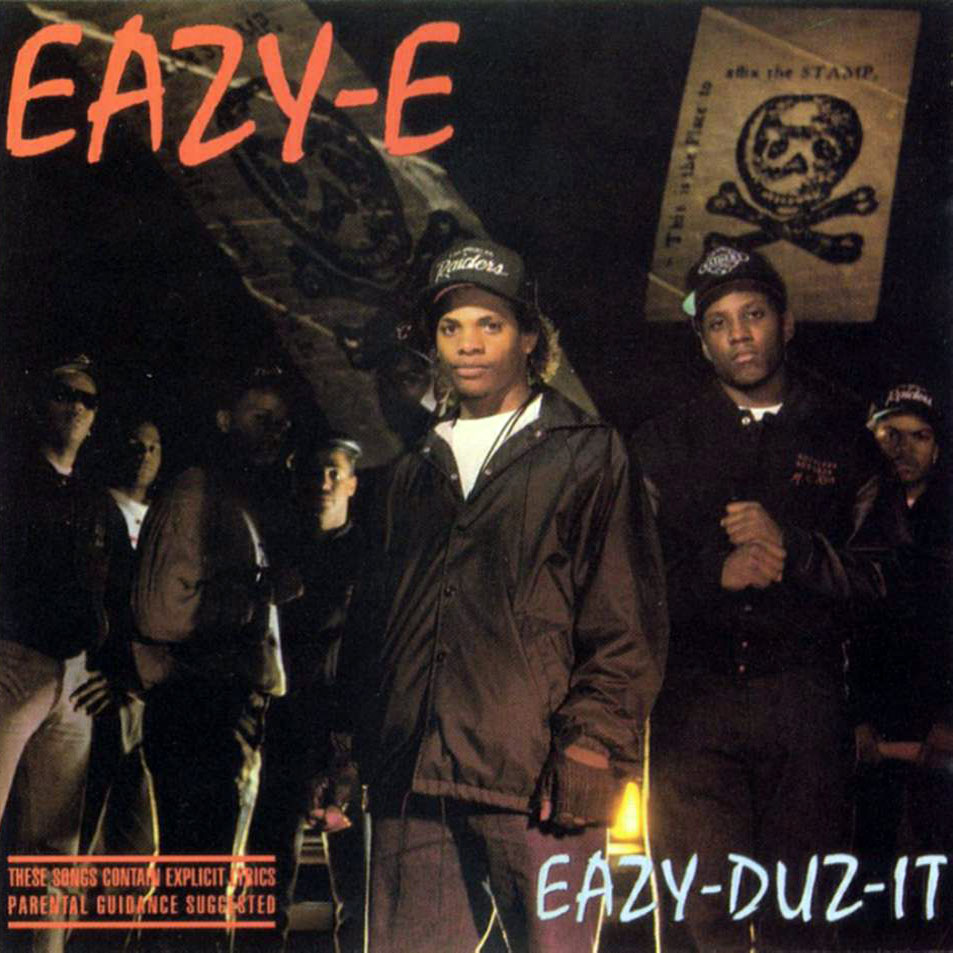

Dre with co-production by DJ Yella, with Eazy-E's production debut. A.'s Straight Outta Compton album, but the original can only be found on the cassette single and has never been released elsewhere. There is a remix version of Compton's N The House that appears on N.

The b-side of the cassette single also contained the original version of the song Compton's N The House which only appears on the cassette single version, the vinyl single has a radio edit of Eazy-Duz-It instead of Compton's N The House. It features the song "Radio" as a b-side. It was released as the lead single from the album of the same name. Eazy’s genius was never in pushing the creative edge when he rejoins MC Ren and DJ Yella for a partial N.W.A reunion on “The Mutha- – -in Real,” they sound like Comptons Most Wanted."Eazy-Duz-It" is a song by West Coast rapper Eazy-E. The album presents some of his best (“Just tah Let U Know”) and worst (“My Baby’s Mama”) material ever. In death, after all, he was courageous and dignified.Įternal E, a fourteen-cut posthumous hits anthology (including N.W.A showcases but omitting the anti-Dre attacks), serves as both fitting tribute and fair sampler for the uninitiated, containing “Eazy-Duz-It,” “Boyz-n-the-Hood,” “Radio,” “8 Ball” and “Only If You Want It.” Eazy had been working on an ambitious new album at the time of his death nearly a year later, Str8 off tha Streetz of Muthaphuckin’ Compton appeared as an epilogue to his career. In choosing to disclose his disease, Wright became a hero even to some former detractors in his last days. He launched his own local radio show, which set the stage for a reconciliation with Ice Cube, with whom he was planning an N.W.A reunion record when he died of complications from AIDS in March 1995. Ironically (or not, if one views Eazy’s pragmatic career with enough cynicism), the businessman rapper was reinvigorated by Dre’s chart success, tapping his moody sound while referring to the onetime glam-rapper as a “bitch” and lambasting him as a phony in “Real Muthaphuckkin Gs” and “It’s On.” (The booklet gives prominent play to an annotated - and already embarrassing - corny old publicity photo of Dre.)Įazy spent most of ’94 consolidating (or rebuilding) his empire, introducing the world to such hardcore acts as the wildly successful Cleveland crew Bone Thugs-n-Harmony. Answering Dre’s harsh assault (The Chronic’s “- – – Wit Dre Day”), Eazy pursues the vendetta with dedicated passion on the eight-track It’s on (Dr. Dre, however, gave Eazy something to focus on. Complete with a Christmas (!) tune, the record fails to project any coherent personality. N.W.A was over when Eazy made 5150 Home 4 tha Sick, an insubstantial EP, despite writing and production by Naughty by Nature, Above the Law, Solid Productions and Threat. Dre and Yella) or even for Eazy’s nasal nursery-rhyme whine, but for lunkheaded lyrics like “I might be a woman-beater but I’m not a pussy-eater.”

“Radio,” a hilarious tribute to seminal Los Angeles rap station KDAY, and the Bootsy Collins-inspired “We Want Eazy” showed promise, but the album is a difficult listen - not for the sharp Stax and P-Funk-styled production (by bandmates Dr.

Swept along by N.W.A’s ascent, Eazy-E released his first solo album, Eazy-Duz-It, in 1988, just before the arrival of Straight Outta Compton. The over-tweaked bass and hyperactive bells of the single helped establish a distinctive West Coast sound. While Cube’s lyrics vividly captured the daily, often deadly, motions and rhythms of the inner city in a way that flattered ghetto youth and intrigued suburban thrill-seekers, Eazy’s deadpan sing-song evinced a super-masculine stoic cool. But at Ice Cube’s coaxing and coaching, as part of the N.W.A posse, Eazy cut “Boyz-n-the-Hood” and “8 Ball” (both included on N.W.A and the Posse) in 1987 and became a contender on the live side of the microphone. When Wright decided to move from drug-selling to the relatively legitimate world of record-making, he never planned to rap, simply to bankroll and promote. But it is also fascinating how much of the persona of Eazy-E - ruthless gangsta, unrepentant misogynist, unscrupulous entrepreneur, airhead Republican and hardcore rapper - was improvised. You can read either the effects of a decade of callous social policies or the bankrupt morality of an entire generation into the story of young Compton hustler Eric Wright’s rise to become one of America’s most controversial stars.


 0 kommentar(er)
0 kommentar(er)
